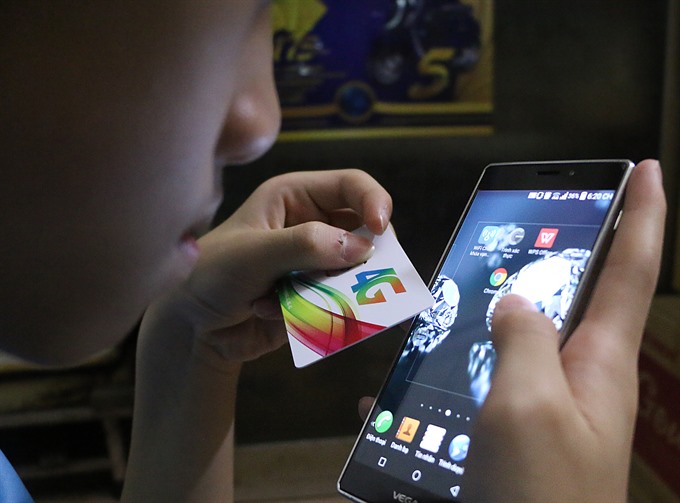No photo, no phone: Customers may lose service
Mobile subscribers may have their SIM cards deactivated if they fail to submit profile photos following a new regulation.
 |
| By 24 April, 2018, all mobile subscriptions activated before 24 April, 2017 must be registered with accurate information about the owners including name, identification number and a profile picture. Otherwise, telecommunication service providers will block incoming calls after 15 days and stop providing services in the next 15 days.— VNS Photo Doan Tung |
Decree 49, issued last year, stipulates that by 24 April, 2018, all mobile subscriptions activated before 24 April, 2017 have to be registered with accurate information of owners including name, identification number and a profile picture. If they fail to register, the providers will block incoming calls after 15 days and stop providing services in the next 15 days.
Viettel said that their only strategy for encouraging customers to comply with the regulation was providing sufficient information. Though the regulation requires companies to start the clock towards cutting off services on 24 April, Viettel has not indicated when it will begin ending service for noncompliant customers, leaving the door open to extensions after 24 April.
Meanwhile, other mobile carriers, Vinaphone and Mobifone, have not provided any further information on the issue.
Le Thi Kim, a Viettel customer in HCM City, told Thanh niên (Young people) newspaper that she was surprised to hear the information. She has subscribed for 12 years and signed up with all information indicated on her identification card.
Nguyen Van Trung, another subscriber, is in the same situation.
“I have to go to a Viettel store to take a headshot as they may stop providing services if my personal information is not sufficient. Such a waste of time,” he said.
Weighty responsibilities
By the end of March, there were 118.7 million mobile subscriptions in Viet Nam, according to the General Statistics Office. It’s common for customers to lack profile photos as the decree was only issued last year.
Nguyen Ngoc Son, dean of the Faculty of Economics and Law under Ton Duc Thang University, doubts the ability of mobile carriers to protect personal privacy for millions of subscribers. According to him, the policy has not received much approval from customers. At present, all personal information of a person is printed on their identification card. Therefore, police can provide the State management agencies with access to citizens’ information using a provided identification number.
“It will be a real danger to users if a data breach happens as their information will be exposed. I wonder if mobile carriers’ responsibilities are clearly regulated and if customers can ask for compensations in case their information is leaked. Therefore, the responsibilities of stakeholders are also in need of regulating,” he said.
Vo Do Thang, a cyber security expert, emphasised that besides tightening the management on mobile subscriptions, policies to protect customers against information leaks needed to be adopted.
“I do not know whether the regulation of customers’ headshot submission will create positive impacts, however, it will definitely push up the social cost,” he said.
In November 2016, Ministry of Information and Communications asked mobile carriers to withdraw SIM cards which are activated before being sold and registered with information incompatible with users.
People usually buy this type of SIM cards to enjoy promotions for a short period of time.
According to the MIC, those SIM cards impose the threats of “fake news”, fraud or even terrorism as people with bad and wrong views can use them to spread bad and wrong information.
(Source: VNS)